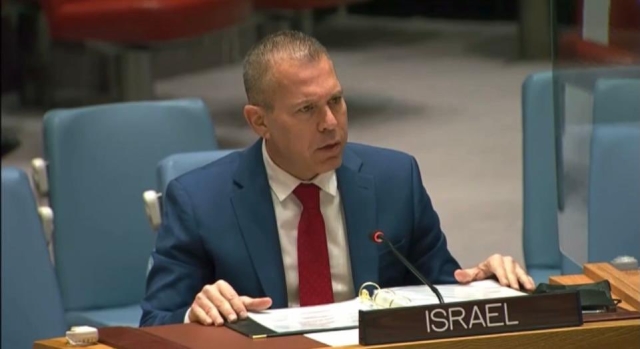In the ongoing efforts to address the two contentious resolution proposals concerning the Gaza war at the UN Security Council, the United States and Israel have joined forces. These proposals, submitted by Russia and Brazil, have sparked intense discussions and disagreements among council members.
The Russian proposal notably avoids any mention of Hamas and its actions during the Gaza war. Conversely, Brazil, as the acting president of the council, has put forth a resolution calling for a "humanitarian ceasefire" in direct contrast to Israel's call for the residents of Gaza to evacuate the city. These differing viewpoints have created a significant rift within the Security Council.
Here is the recording of our stakeout after UN Security Council meeting on the ongoing crisis in the Middle East: 👇🏻 https://t.co/3ZvAxp3dpM pic.twitter.com/srmW5aVEz7
— Dmitry Polyanskiy 🇺🇳 (@Dpol_un) October 13, 2023
Israel's Ambassador to the UN, Gilad Erdan, is collaborating closely with the American delegation to thwart these resolutions and prevent a vote on them during an upcoming council hearing. As of now, a specific date for the meeting has not been scheduled, indicating the seriousness of the discussions taking place.
One critical issue at hand is the lack of a consensus on the resolution's text among Security Council members. Russia remains adamant in its opposition to condemning Hamas, while Great Britain and France are equally steadfast in their insistence on such condemnation. Additionally, they reject Brazil's version, which calls for Israel to refrain from evacuating the Arab population of Gaza. Brazil, in its role as the acting council president, has allowed member countries to submit amendments until a deadline of Tuesday at 06:00 AM Israel time. The United States is actively working to delay any decision related to the war at this stage.
These resolutions come at a time when Russian President Vladimir Putin has once again criticized Israel, accusing it of responding to Hamas's "unprecedentedly brutal attack" with equally brutal tactics. He drew a controversial parallel by likening the situation in Gaza to the Nazi siege of Leningrad during World War II. The Leningrad siege, which endured for over two years, resulted in the tragic deaths of more than 750 thousand citizens.
The @UN Security Council will meet today to discuss the developments in Israel. Israel is facing brutal terror attacks, the likes of which we have never seen before. This is our 9/11. The civilized world must stand with Israel and with our right to self defense. pic.twitter.com/n8xCAQvqJI
— Ambassador Gilad Erdan גלעד ארדן (@giladerdan1) October 8, 2023
Notably, Russia has refrained from expressing public support for Israel since the outbreak of the conflict with Gaza. Instead, they have found justifications for Hamas's actions. This isn't the first time Putin has used such a comparison; in 2014, shortly after Russia's annexation of Crimea, he likened Ukraine's resistance to Russian separatist forces to the Nazi blockade.
Putin made these statements about Israel during a visit to Bishkek, the capital of Kyrgyzstan, where he acknowledged an understanding of the "logic behind the events" in the Middle East. His comments were in response to the extensive airstrikes in Gaza following the invasion by Hamas terrorists into the southern part of Israel.


